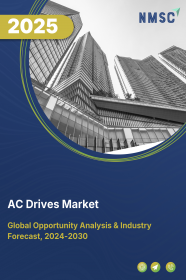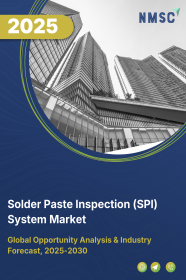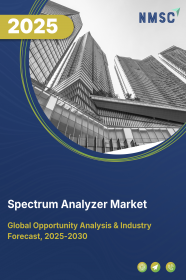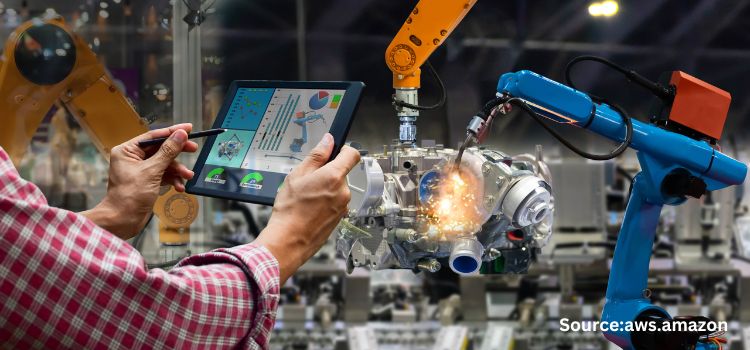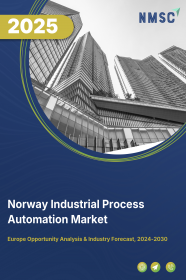
Norway Industrial Process Automation Market by Component (Manufacturing Execution System (MES), Distributed Control System (DCS), Programmable Logic Control (PLC), Supervisory Control & Data Acquisition (SCADA), Field Instruments, Industrial Robots, and Process Analyzers and Drives), and by End-User (Oil & Gas, Chemical & Refining, Energy & Power, Pulp & Paper, Metals & Mining, Pharmaceutical, Cement & Glass, and Others) – Opportunity Analysis and Industry Forecast, 2024–2030
Industry: Semiconductor & Electronics | Publish Date: 17-Feb-2025 | No of Pages: 123 | No. of Tables: 89 | No. of Figures: 54 | Format: PDF | Report Code : SE986
Norway Industrial Process Automation Market Overview
Norway Industrial Process Automation Market size was valued at USD 64.0 million in 2023, and is predicted to reach USD 93.7 million by 2030, at a CAGR of 5.0% from 2024 to 2030.
The industrial process automation market refers to the industry that provides technologies and systems designed to monitor, control, and optimize industrial operations. It involves the integration of advanced computer technology, hardware, and software solutions to automate key processes such as inventory management, manufacturing, production, and quality control.
The key technologies include sensors, programmable logic controllers (PLCs), human-machine interfaces (HMIs), and supervisory control and data acquisition (SCADA) systems. This market serves industries such as oil and gas, chemical processing, food and beverage, and pharmaceuticals, where automation is crucial for improving operational efficiency, product quality, and workplace safety.
By reducing costs and minimizing human error, industrial process automation enables companies to streamline their production processes, ensuring higher output with greater precision. The demand for industrial process automation solutions continues to grow as businesses seek to enhance productivity and remain competitive in an increasingly automated global manufacturing environment.
Dominance of Oil, Gas, and Hydro-Power Industries Fuels the Market Growth
Norway's position as a leading global producer and exporter of oil and gas significantly impacts its industrial process automation market. The oil and gas sector constitutes nearly half of Norway’s exports and about 20% of its GDP.
Automation plays a critical role in this industry by monitoring and controlling the flow of oil and gas, regulating pressure and temperature, and ensuring equipment operates safely. Similarly, Norway’s extensive network of hydro-power plants relies on Distributed Control Systems (DCS) technology to manage water flow, optimize electricity generation, and maintain operational efficiency and safety.
The integration of automation solutions in both oil and gas and hydro-power sectors drives substantial demand for process automation technologies, supporting the country’s energy-intensive industries.
Expansion into Nuclear and Wind Energy Projects Drives the Growth of the Market in Norway
Norway is actively advancing its energy portfolio by developing nuclear power plants and wind energy facilities, further boosting the Norway industrial process automation market growth. For instance, in January 2023, SeaTwirl and the Marine Energy Test Centre received approval from Norway’s Ministry of Energy to trial a vertical-axis floating wind turbine prototype at a former fish farm in Boknafjorden.
This project utilizes automation solutions to monitor and control wind turbine operations, aiming to maximize energy production, reduce predictive maintenance costs, and ensure safe offshore wind turbine operations during the pilot phase. These developments highlight Norway’s commitment to incorporating advanced automation in emerging energy projects, that contributes to the growth of the industrial process automation market in the country.
Lack of Standardization Hinders the Growth of Industrial Process Automation Market
The lack of standardization is a significant barrier to the Norway industrial process automation market expansion. Without established standards, vendors may develop proprietary systems that are difficult to replace or upgrade.
This can result in vendor lock-in, where companies become dependent on a specific vendor’s technology, restricting their ability to switch providers. Vendor lock-in can lead to higher costs, reduced flexibility, and diminished innovation, that stifle market growth. Companies might be reluctant to invest in automation systems if they are concerned about being tied to a particular vendor, further impeding market development.
Industry 4.0 Technologies Paving the Way for Future Automation Opportunities
The advancements in industry 4.0 technologies, such as the internet of things (IoT), cloud computing, and artificial intelligence (AI), are opening up significant opportunities for the industrial process automation market.
These technologies allow companies to gather and analyse large amounts of data in real-time, offering valuable insights into their operations and highlighting areas for improvement. As technology evolves quickly, market participants are partnering with tech-focused companies to create new solutions based on established technologies.
Competitive Landscape
Several key players operating in Norway industrial process automation industry include Siemens AG, Honeywell International, Schneider Electric, Mitsubishi Electric, Rockwell Automation, Emerson Electric Co., ABB Ltd., Omron Corp., Fanuc Corp., Toshiba Corp., and others.
Norway Industrial Process Automation Market Key Segments
By Component
-
Manufacturing Execution Systems
-
Hardware
-
Software
-
Services
-
-
Distributed Control Systems
-
Hardware
-
Software
-
Services
-
-
Programmable Logic Control
-
Hardware
-
Software
-
Services
-
-
Supervisory Control and Data Acquisition (SCADA)
-
Hardware
-
Software
-
Services
-
-
Field Instruments
-
Industrial Robots
-
Process Analyzers & Drives
By End-User
-
Oil & Gas
-
Chemical & Refining
-
Energy & Power
-
Pulp & Paper
-
Metals & Mining
-
Pharmaceutical
-
Cement & Glass
-
Others
Key Players
-
Siemens AG
-
Honeywell International
-
Schneider Electric
-
Mitsubishi Electric
-
Rockwell Automation
-
Emerson Electric Co.
-
ABB Ltd.
-
Omron Corp.
-
Fanuc Corp.
-
Toshiba Corp.
REPORT SCOPE AND SEGMENTATION:
|
Parameters |
Details |
|
Market Size in 2023 |
USD 64.0 Million |
|
Revenue Forecast in 2030 |
USD 93.7 Million |
|
Growth Rate |
CAGR of 5.0% from 2024 to 2030 |
|
Analysis Period |
2023–2030 |
|
Base Year Considered |
2023 |
|
Forecast Period |
2024–2030 |
|
Market Size Estimation |
Million (USD) |
|
Growth Factors |
|
|
Companies Profiled |
10 |
|
Market Share |
Available for 10 companies |
|
Customization Scope |
Free customization (equivalent up to 80 working hours of analysts) after purchase. Addition or alteration to country, regional, and segment scope. |
|
Pricing and Purchase Options |
Avail customized purchase options to meet your exact research needs. |

















 Speak to Our Analyst
Speak to Our Analyst



